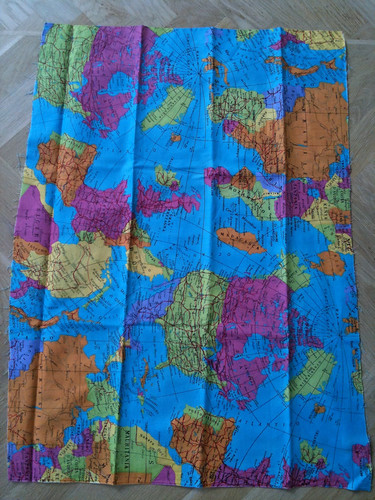
sausages at the marketNorth America is big. Really big. You may think it's a long way down to the grocery store, and in general, it is. And this is the source of many problems.
First, when the grocery store is far away, you're likely to go less often. This has two consequences: you'll buy more food and less of it fresh. Buying more food generally leads to buying things you won't end up using (it's hard to always plan perfectly just what you'll need a week or more in advance) and fresh food tends to be the healthiest. So already, you're set up to be less healthy and to waste food.
Next, for whatever reason it originally started, stores in North America carrry enormous bulk sizes of things. The smaller quantities are then priced unnattractively, so that it seems like a financially sensible choice to buy the large size. This makes your groceries heavy and since your grocery store is far away, it's not feasible to walk. So you're spending more money because you're buying more food at a time and you're driving instead of walking, which is worse for both you and the environment (and costs you even more money when you consider all the tangential costs of cars).
Finally, because you've had to buy lots of food, in large quantities, you need a larger space to store all that stuff. So you're spending more on your home or apartment.
In contrast, consider if your grocery store was 5 minutes walk away. It would be more hassle to drive there and find parking than to just walk over. Then you'd have to buy less stuff because you'd need to carry it home, but if you're that close to the grocery store, you can go every couple of days. So suddenly, you can buy fresh food every couple days and be more accurate in planning what you'll use and get some exercise too. I was lucky enough in Montreal to be in this situation. There were small grocery stores scattered all over my neighbourhood, so I could easily walk to the store every few days. The one piece that still caused a problem, though, was the way small quantities of pantry items tended to be overpriced compared to the bulk sizes.

fresh sconesSomething that annoyed me initially in Amsterdam was the lack of bulk sizes. I do a lot of home baking and go through flour pretty quickly. I was used to buying 10 kg bags. The bags of flour here are 1kg. However, the key difference I've realised is that I'm not paying a markup for the small package. It's about 0.58 € (includes taxes) and while I can't pop into a Canadian grocery store at the moment to check, I can just about guarantee that a 1kg bag of flour will cost more than $0.80! Once you lose the pricing incentive to buy the large size, it suddenly becomes clear that bulk purchasing is really not advantageous. It means you have more money tied up in "stuff" that you don't really need yet, for some things it means they won't be as fresh when you get to using them (or might even be spoiled if you get bugs or mice), and it means you need space to store all your bulk stuff. If you're walking home with groceries, it's also much nicer to be carrying 1kg at a time rather than 10kg!
I think many of our current problems in North America could be solved by returning to an urban model where it was convenient to walk to stores (and if we got over the obsession with bulk and "supersize" options). It would be better for our health, our pocketbooks, and for the environment. But why won't it happen anytime soon? Because it means more overhead costs for the corporations and thus smaller profit margins. Shopping at farmer's markets and smaller shops is great if you have that option. But what can people stuck with a distant, monolithic grocery store as their only option do?
I don't have the solution other than to say that it presumably works in Europe, so why not in North America?
















